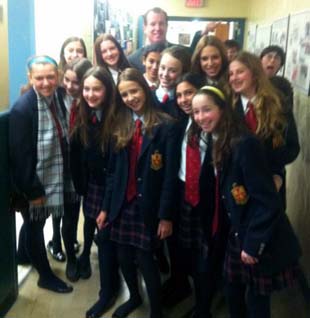 It was a great opportunity to spend some time with students last week at the NDG Food Depot. It is a short distance from LCC in the heart of NDG. We have worked in partnership with the food bank for several years, raising funds and sending student volunteers. This past December our senior students impressively brought food here for the food bank in large quantities: more than 100 large boxes, compared to only 35 only two years ago. This is an impressive outreach for families in need prior to the onset of winter.
It was a great opportunity to spend some time with students last week at the NDG Food Depot. It is a short distance from LCC in the heart of NDG. We have worked in partnership with the food bank for several years, raising funds and sending student volunteers. This past December our senior students impressively brought food here for the food bank in large quantities: more than 100 large boxes, compared to only 35 only two years ago. This is an impressive outreach for families in need prior to the onset of winter.
In the past couple of years demand at the food depot has increased. So who are the individuals and families in need? Along with a group of Middle School students from the Round Square Conference we hosted, I learned that we are often misguided by our assumptions/biases about those who are in need. The homeless who sometimes beg on our street corners are not the primary customers of our local food bank. The regular clientele is actually somewhat surprising. There are a host of categories: recent immigrants who are having a tough time adapting to Quebec culture and language requirements, refugees from all over the world who have desperately fled countries that are politically dangerous, the elderly on small incomes, the disabled, unemployed, and the working poor.
In fact, before the students helped to sort and pack food into single baskets, the people at the food bank had our students complete a very effective exercise to learn more about the food bank’s regular clientele. In teams, the students reviewed the small incomes of various categories of clients and were asked to make choices about how they would budget their money if they were to find themselves in the same circumstances. This meant looking at a chart of costs for essentials: apartment rental, food, heating, basic transport and other expenses. The students attempted to budget, and interestingly, not one group was able to get by on the small monthly incomes that reflect the real incomes for many people in our community, but not the visible homeless who struggle on our streets. Most striking perhaps for all of the students was the realization that if you have a full time job at minimum wage in Montreal ($ 9.50/hr.), your total income per month after tax and other deductions is below $1,400/month—which is considered to be below the poverty line. In doing their calculations, students realized that even those working people are trapped in a cycle of poverty where they cannot afford nutritious food—and what we might consider as basics. Phone, Internet, computer, and TV were not part of their budgets as they are unaffordable.
Why are so many people become dependent on handouts twice a month from the NDG Food Depot. They are the old, the lonely, the disabled and minimum income earners with children who cannot get by on what they earn, even though they do their best and have full-time employment
We cannot live in a bubble here at LCC. Within in our local community there are many needs, and we have the energy, disposition and capacity to help assist in many ways. Also, as students there is much to be gained by being exposed to the difficult challenges faced by so many in our city. What can our students learn from the resilience of others? What are the social challenges of hunger, housing shortages, youth disconnected at school? These are the realities you see when you are at the NDG Food Depot or one of the other 40 agencies our students are currently involved with through active service learning. There is much to be gained from this curriculum of life and extending a welcoming hand in service of others. “Non Nobis Solum” —it was the founding ethos of our school. I believe we need to recommit to it today as an essential educational principle to help students develop as aware, capable and involved citizens.
Service learning is surely about opening eyes, and it is perhaps one of the most important pillars of our curriculum at LCC. I hope our extended school community will fully embrace the opportunities that service learning offers. —Chris Shannon, Headmaster
 There’s an old adage that “temper is what gets most of us into trouble, but it is pride which keeps us there.” This can be an issue at school where students are in close quarters and face the daily challenge of balancing demands from parents, teachers, friends and acquaintances.
There’s an old adage that “temper is what gets most of us into trouble, but it is pride which keeps us there.” This can be an issue at school where students are in close quarters and face the daily challenge of balancing demands from parents, teachers, friends and acquaintances.



